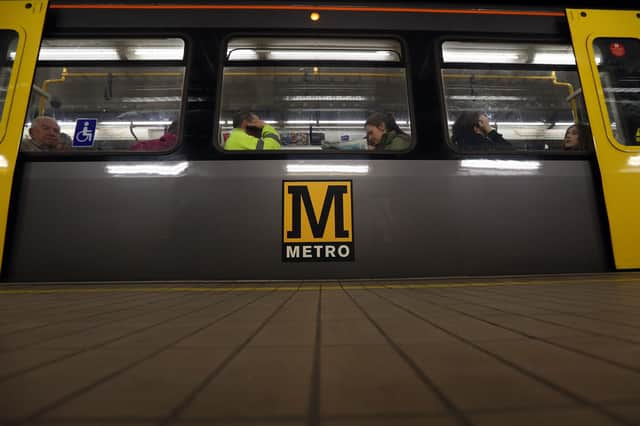£100million Metro upgrade in South Tyneside to press ahead, despite budget worries


Major improvement work is due to start next year on a project that will mean passengers outside central Newcastle and Gateshead will get a train every 10 minutes and boost the system’s capacity by 24,000 people a day.
The ‘Metro Flow’ scheme, which will cost £103million, involves dualling three single-track sections of the line between Pelaw and Bede – removing a problematic pinch point and allowing more trains to run.
Advertisement
Hide AdAdvertisement
Hide AdThe works will take place on an 800m strip between Pelaw and Hebburn, 1.4km between Hebburn and Jarrow, and another 600m between Jarrow and Bede.
Yet the promise of more regular services comes at a time when Metro operator Nexus is facing a massive budget crisis, with deficits of almost £20million predicted in each of the two years after emergency Covid bailout funding from the government ends next April.
The huge shortfalls have sparked warnings that, unless ministers or local councils are willing and able to plug the gap, Nexus may have to make major cutbacks.
Advertisement
Hide AdAdvertisement
Hide AdBut transport chiefs say that they will still press ahead with the plan to run more trains despite the added cost of doing so, in the hope that a better service will attract more passengers and improve revenue.
A Nexus spokesperson said: “We are committed to delivering the Metro Flow project, for which we have successfully attracted over £100million of Government funding, which will boost the capacity for an extra 24,000 customer journeys every day.
“The focus of Metro’s recovery must be about stimulating demand. Our investment in Metro Flow, and in the new train fleet, is to improve train availability, punctuality, and reliability as well as increasing service frequency and reducing disruption.
“We continue to work through our budget challenge with the Joint Transport Committee, our local authority partners and the Department for Transport, who recognise the vital role that Metro has to play in our region’s economic recovery from the Covid-19 pandemic.”
Advertisement
Hide AdAdvertisement
Hide AdThe Government committed £95million towards the cost of the Metro Flow scheme, part of which has been used to order four extra trains for the network’s new fleet currently being built in Switzerland.
Work to dual the track will necessitate a massive 12-week shutdown of Metro services in South Tyneside, expected to start in September 2022.
The three sections which need to be upgraded, via the electrification of an existing freight line, are the only remaining parts of the Metro where trains must share the same line in both directions – causing delays as drivers wait for the green light to proceed.
Alan Metcalfe, South Tyneside Chair for the North East England Chamber of Commerce, said in September: “This has the potential of being a huge boost for the businesses in South Tyneside in that they can draw on potential new employees from a market that previously was untapped due to infrastructure shortfalls.
Advertisement
Hide AdAdvertisement
Hide Ad"This will have a massive impact on the economy of the area as more realise what a good place to work, and to visit, South Tyneside is.”